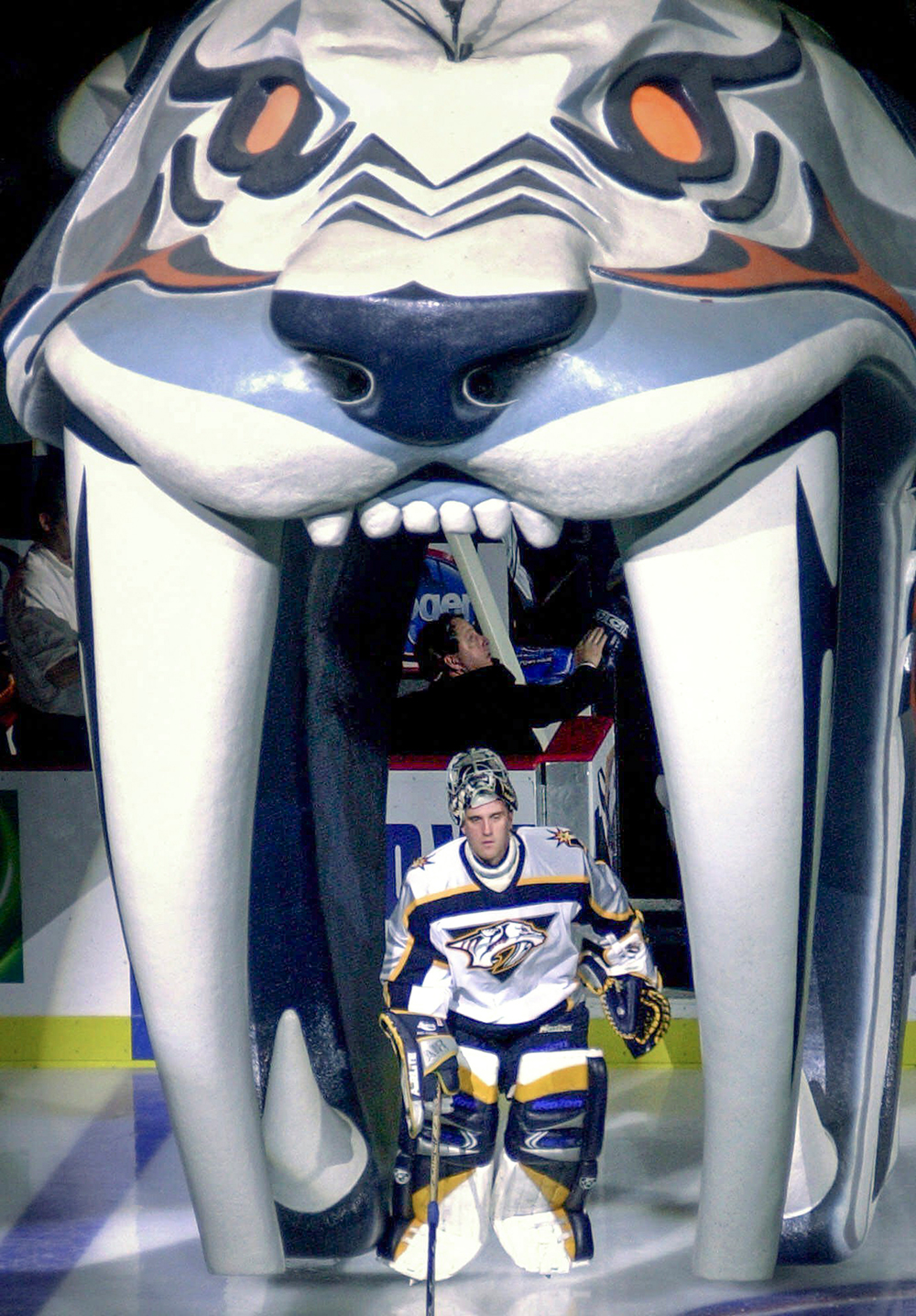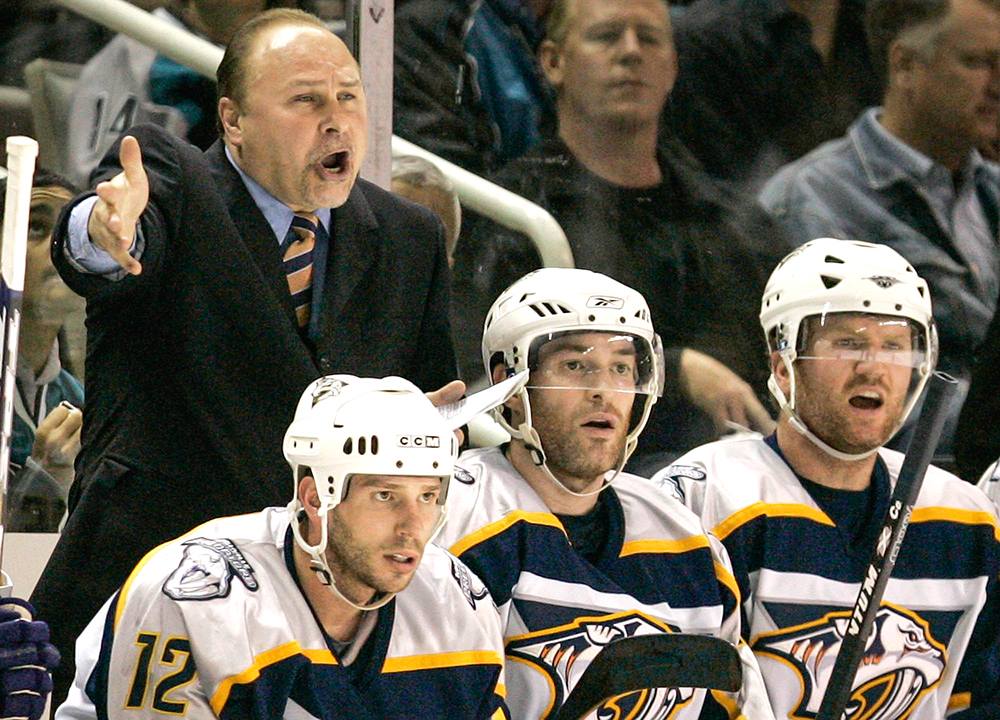In the five-part series, “What to Expect When You’re Expanding,” executives who helmed year one NHL expansion franchises in Atlanta, Anaheim, Nashville, Minnesota and Columbus share their stories from those early seasons—in part to show Vegas Golden Knights GM George McPhee just how good he and his team have it.
If you missed it, find part one—on Cliff Fletcher’s Atlanta Flames—here, and part two—on the Sharks and Ducks—here.
An expansion team is just about the last place you should go looking for stability and continuity in the National Hockey League. History shows that bodies roll in and out of the lineup in the first few seasons. When losses mount and fans, past the novelty stage, expect more, general managers and coaches pay the price. Turnover is just a given.
And then there’s Nashville.
David Poile embodies the Predators’ ethic. If he isn’t the most cautious, meticulous and fiercely loyal executive in the league, he’s in the top one percent. He has never been one to gamble in the free-agent market, never one to chase immediate success at a heavy long-term cost. Hired in the summer of 1997, Poile is the only general manager Nashville has ever had.
Poile came in with a lot of ideas about the best way to build a franchise from scratch. He had already seen the process firsthand. He was a second-generation expansion GM. His father, Bud Poile, a Hockey Hall of Famer, was the original GM of the Philadelphia Flyers. “As a teenager, I would go with my dad to drafts, to the Queen Elizabeth Hotel in Montreal, and I would meet all the executives from around the league,” Poile says. “I saw it all firsthand—what my father went through in Philadelphia, the things that worked out and the things that didn’t.”
Not long after the ’67 draft, Philadelphia’s first, Poile gained hands-on experience in the expansion process. Just out of college and just after a brief run as a minor leaguer, Poile landed in the front office of the Atlanta Flames, reporting to GM Cliff Fletcher.
“I was in Atlanta while Cliff and the others on the staff were out on the road,” Poile says. “Some of it was the usual office stuff—I had to run the Name the Team contest. But even though I wasn’t out there [with the scouts], it was an education. I drew up the forms that the scouts filed on players and every report was filed through me.”
These experiences in the game served Poile well when he worked in the Washington Capitals’ organization, where he was promoted to the GM’s post in the early ‘80s. But they really hit home when he took the Nashville job.
He knew exactly what to expect from the pool of talent—he had, after all, drawn up protected lists in Washington through three rounds of expansion. “Going into a draft, you know that there are going to be hard-working players and that you’re going to have to get lucky to find skilled guys,” he says. “And you can’t count on getting lucky.”

Poile had a couple of clear-cut strategies.
One: The Preds were only going to be as successful as their last line of defence. So the GM spared no sweat or spadework scouting the goaltenders who would be unprotected.
Says Poile: “My father had some early success with the Flyers because of [goaltender] Bernie Parent. They finished in first in their division back in ’67-68, and Bernie was still there—a key guy for them—when they won their Cups in the mid-‘70s. A good goaltender can conceal a lot of flaws on your team, and with an expansion team you’re going to have flaws. A good goaltender is going to keep you in games when you’re outmanned, [and that] works for the team in front of him and the crowd in the stands. So goaltending was a priority for us.”
Poile and the Predators hit a home run when they selected Mike Dunham, who had been backing up Martin Brodeur in New Jersey. It could have been tough to come up with quality intel on Dunham simply because he was so little used by the Devils the season before: He played in only 15 games, figured in only 13 decisions. His numbers were solid, a 2.25 goals-against average and a .913 save percentage. Still, it was a small sample size to work with.
The Predators, though, had something more than Dunahm’s recent form to go on. Poile was operating his staff on a shoestring budget, so in an act of just-about-unprecedented generosity the Anaheim Ducks GM lent scout Paul Fenton to the expansion team for the duration of the 1997-98 season.
“I had seen Mike play lots over the years,” Fenton says, “in New Jersey, with the Devils’ affiliate in Albany. I had played in the AHL in Binghamton when Mike was a kid, and I saw him play when he was 10 or 11 years old, all the way back. So I had a handle on who he was and how he’d work for us. He had tremendous talent.”
That Nashville was targeting Dunham was an open secret—in advance of the expansion draft, then-New Jersey GM Lou Lamoriello had tried to deal Dunham and get an asset in return.
By Nashville’s third season, Dunham had broken into the league elite: His .922 save percentage in the 2000-01 campaign was second-best in the league, behind only Dallas’s Marty Turco. With Dunham lighting the way, the Predators finished just two games below .500.
Nashville had one brutal break in net, selecting Brian Finley sixth overall in 1999. Finley came in with a pedigree like Roberto Luongo but had his career cut short by a couple of disastrous injuries and played in only four NHL games. Still, Poile takes a special pride in the job that his organization has done in identifying goalies. “Between [current Preds No. 1 Pekka] Rinne, Tomas Vokoun, Chris Mason, Dan Ellis, right back to Dunham, we’ve taken strength from that continuity. There has been a lot of shuffling over the years.”

Two: Coaching.
Poile: “I had a lot of advice about what to do with coaching. Everyone was telling me that you have to go with a veteran coach with an expansion team. I decided to go the other way.”
Poile ended up hiring Barry Trotz. Again, like with Dunham, it came down to history: Trotz had scouted for Poile in the late ‘80s and then coached the Capitals’ AHL affiliate in Baltimore and later Portland. Trotz coached Nashville from Year One until the end of the 2013-14 season. At that point, Trotz not only was the longest-tenured coach in the NHL but, among coaches in the four major North American sports leagues, he was second in tenure with one team to only Gregg Popovich of the San Antonio Spurs of the NBA. By way of comparison, through to the spring of 2014, the Columbus Blue Jackets had employed seven head coaches in their history and played two fewer seasons than Nashville.
“You have to believe in your coach and give him a chance to do his job, and that’s how it was with Barry,” Poile says.
Looking back on the season in advance of the expansion draft, Poile has fond memories. “It was one of the best experiences of my hockey career,” he says. “Over the course of the year, going to NHL arenas, I was able to just watch games, not dealing with contracts or agents or getting too wrapped up in a losing streak or an injury or anything like that. I had a chance to talk to other GMs and build relationships with them—I didn’t have a team, so I’m not a competitor, not yet. And I really think those relationships carried forward and made it easier to talk to other GMs.”
Poile suggests GM George McPhee and the Vegas Golden Knights are in a much better position than the Predators were back in the ramp-up in Nashville.
“There is going to be a far better pool of talent available for George in June,” Poile says. “And George has great resources to work with. We had a very small staff [in the season before the expansion draft]. George has 30 or so on his hockey operations staff right now. That’s not just far more than we had in ’97. That’s 10 or 12 more than we have right now.”
Poile says that luck of the draw at some point will factor in. When it first did for the Predators, it wasn’t a good bounce. “[Going into] our first year we had the second pick in 1998 entry draft,” he says. “The top pick in that year’s draft was Vinny Lecavalier. We got David Legwand, who was No. 2 on everyone’s list. David was a good player for us but he wasn’t Vinny Lecavalier. With Lecavalier the picture, [Nashville] would have looked very different.”
Lecavalier went on to be a first-line player on a Stanley Cup-winning team, the MVP of the 2004 World Cup. David Legwand was a great skater but lacked the puck skills to be anything more than a checking-line player. Yet he might be the best measure of Poile’s belief in continuity in the building of the Nashville franchise: Though Legwand never amounted to anything like a franchise player, though he scored 20 goals in a season only twice, he stayed with the Predators until the 2014 trade deadline.









